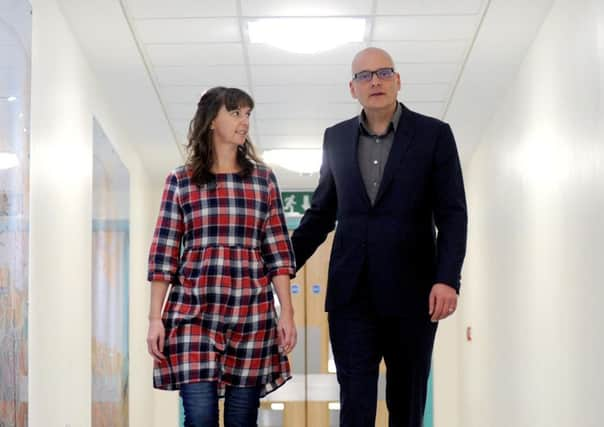Tributes to ‘braveheart’ nurse who beat Ebola


The Scottish nurse contracted the disease after working with a charity treating sufferers in Sierra Leone.
In an exclusive interview with The Scotsman’s sister paper Scotland on Sunday, Ms Cafferkey, from Cambuslang, in South Lanarkshire, revealed how the illness took her from wondering “what all the fuss was about” to the brink of death.
Advertisement
Hide AdAdvertisement
Hide AdThe 39-year-old was discharged from hospital on Saturday after making a complete recovery. It is thought she has now returned to Scotland, having spent three weeks in a high-level isolation unit at the Royal Free Hospital in London.
Ms Cafferkey, a nurse for the past 16 years, became the first person to be diagnosed with the illness in the UK on her return from the African country on 30 December.
FOLLOW US
-----------------------------------------
-----------------------------------------
SCOTSMAN TABLET AND MOBILE APPS
She works at the Blantyre Health Centre in South Lanarkshire, but had been volunteering with Save the Children at the an Ebola treatment centre in Kerry Town, Sierra Leone.
Yesterday colleagues and neighbours said they were delighted she was now back to full health.
“We are delighted to hear that Pauline has made a full recovery from Ebola and is back home,” said a spokesperson for NHS Lanarkshire.
“We hope Pauline is given the time and space she needs to recuperate and we look forward to welcoming her back once she is ready to return.”
Residents in the Fife village of Crossgates, where Ms Cafferkey grew up and went to school, described her as a “true braveheart” and said they were proud of what she had done.
Lesley Laird, deputy leader of Fife Council, paid tribute to the nurse’s “bravery and selflessness”.
Advertisement
Hide AdAdvertisement
Hide AdShe said: “On behalf of everyone in Fife, I would just like to say how pleased we are that Pauline has made a full recovery.
“Her bravery and selflessness are without question. She put her own life at risk to help others and we are all so relieved that she is well again and able to return home.
“I send her very best wishes for the future from everyone at Fife Council.”
Ms Cafferkey’s parents Michael and Jean and other family members still live in Crossgates.
One local man, who did not want to be named, said: “People have been calling her braveheart, and I think that’s true. It’s exactly what she is.”
He said that the whole community was proud of the work she had done in crisis-hit Sierra Leone and the courage she had shown after contracting the disease herself.
But he said the past few weeks had been a very difficult time for her and her family, and now they all deserved some privacy.
George Mohammad, who has run the Mossgreen Store in Crossgates for more than 25 years, said; “Everyone is delighted to hear that Pauline is feeling better and has finally got home.
Advertisement
Hide AdAdvertisement
Hide Ad“The community is very proud of her work and relieved that she has made a full recovery.
“Her family must be over the moon.”
Another local shopkeeper said: “It’s really great news after everything she has been through.”
Ms Cafferkey flew to Freetown in Sierra Leone in November after nine days of training. She was part of a group of 30 NHS staff, including nurses, psychiatrists and emergency medicine specialists.
She was sent to hospital when she reported feeling unwell after landing at Glasgow airport. She had already passed health checks carried out at London Heathrow and been allowed to travel onwards to Scotland.
Ms Cafferkey said how her symptoms had taken time to emerge, but by her lowest point she believed she would die and told her doctors: “That’s it. I’ve had enough. I can’t carry on any more.”
She added: “I didn’t get steadily worse and I was fine for the first two or three days and couldn’t understand what all the fuss was about, but then I did deteriorate.”
The illness and medication left her semi-conscious, with a painful rash and a sensitivity to contact and needles and she said she cannot remember a week of her two-week treatment.
Ms Cafferkey was treated with an experimental anti-virus drug, ZMabb, and blood plasma from survivors.
Advertisement
Hide AdAdvertisement
Hide AdShe said she will donate her own plasma to help others battling the disease in Africa.
Chief executive of Save The Children, Justin Forsyth, described Ms Cafferkey as a “dedicated humanitarian” and said he was “delighted” for her and her family.
Save the Children is investigating how Ms Cafferkey contracted the disease.